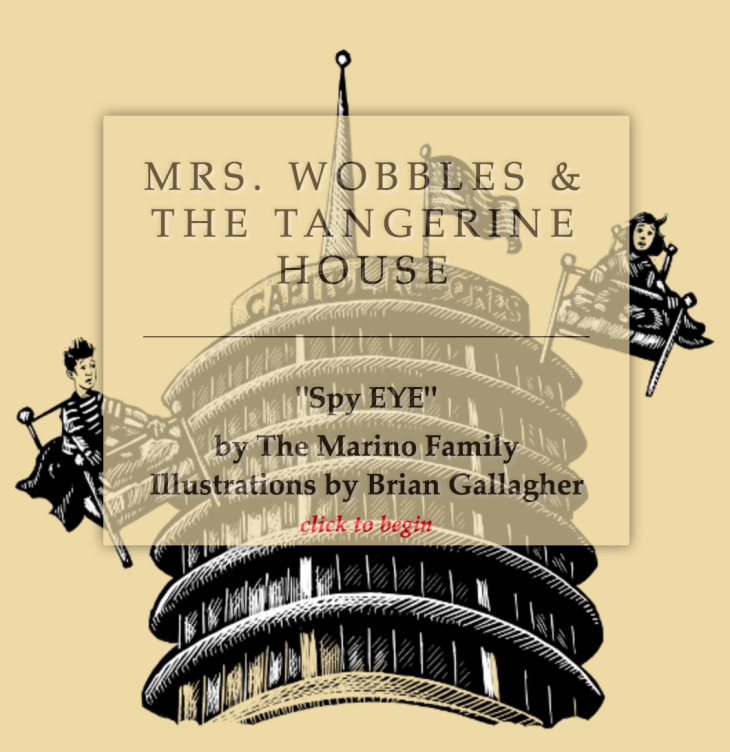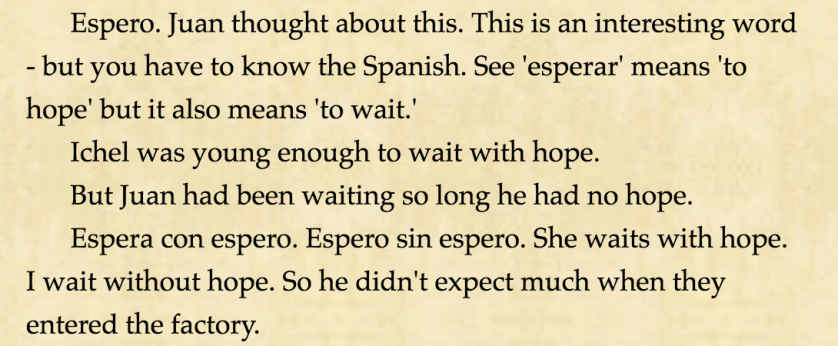 From Spring Thing 2018, Spy EYE is a continuation of the Mrs. Wobbles series (Mysterious Floor; Parrot the Pirate; Switcheroo). Like the earlier pieces in the series, it’s an Undum work that tells a part-fantasy, part-reality story about children in foster care. (I also highly recommend Lucian Smith’s guest post about Switcheroo.)
From Spring Thing 2018, Spy EYE is a continuation of the Mrs. Wobbles series (Mysterious Floor; Parrot the Pirate; Switcheroo). Like the earlier pieces in the series, it’s an Undum work that tells a part-fantasy, part-reality story about children in foster care. (I also highly recommend Lucian Smith’s guest post about Switcheroo.)
In this case, the protagonists are a Latinx brother and sister whose parents are missing, and the story revolves around going to look for them and rescue them.The story lets you play as either Juan (the older brother) or Ichel (the younger sister), and they have different takes on whether to expect their parents back any time soon. That touch reminded me of a few other stories where the choice of viewpoint character is meant to shed some light on a family situation — Stephen Granade’s Common Ground, most notably.
The subject-matter of these stories has progressed over the course of the Mrs. Wobbles series, and this one definitely feels like it’s for slightly older children than the first episode or two.
In Spy EYE, the kids are able to spend more time outside of their house, and we get more of a view of where they live, a much more detailed and vibrant representation of Los Angeles and its environs than we saw in previous games. At one point, they learn how to make their beds fly, and in a somewhat Mary Poppins sequence, visit West Hollywood and Koreatown and other LA neighborhoods — in each case getting a sense of how the social norms of the area might affect family life and personal freedom.
Meanwhile one of the sinister forces of the story is the Santana wind. Anyone who’s ever lived in LA is likely to appreciate how the Santa Anas correlate with impatience, irrationality, and a prickly sense you might at any moment come out of your own skin.
The gist of the story is challenging, though it’s wrapped in some playful fantasy imagery. The parents in this story are not dead, but they’re going through some things that make it impossible to take care of their children right at the moment. Can our protagonists accept that fact, and wait, and at the same time hold onto the faith that their family is still a family? It’s a situation that asks these children for a degree of empathy and long-term perspective-taking well beyond their years: even adults may have trouble realizing that their parents are limited and human, and forgiving them for it.

Previous stories in this series have added some power-up features designed to reward the player for reading as much optional text as usual, but in the earlier versions they weren’t always fleshed out, and in some cases didn’t seem to do much. Here, those systems have been a bit more rigorously implemented, with the ability to collect poems and gather “page points”. These allow free rewinds at certain points in the story, and unlock a few extra attacks in the final battle.
There were a few points where I felt the story would have benefitted from a bit more proofreading, and several others where I felt the fact that I wasn’t really the target audience. I also felt uncomfortable about the way a major antagonist is labelled as “voodoo dude,” as a way to automatically mark him as sinister: this is an area where someone else would be much better equipped than I am to speak to stereotypes and cultural representation, though.
And since I’m talking more than usual about interface this month: Undum has been around for a few years now, and this piece is using its affordances in a pretty standard way. It still works well. The animation of new text and the sense of continuous flow make this a good tool for stories with relatively sparse branching and a fair number of click-to-continue sorts of links. Spot illustrations do well in this kind of interface, and the Marinos make good use of that, with some quality art in a style that’s been consistent across all four episodes.